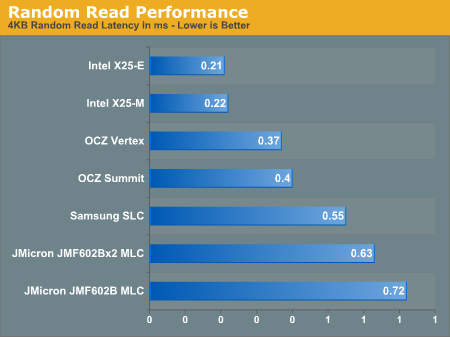The SSD Anthology: Understanding SSDs and New Drives from OCZ
by Anand Lal Shimpi on March 18, 2009 12:00 AM EST- Posted in
- Storage
SSD Aging: Read Speed is Largely Unaffected
Given the nature of the SSD performance-over-time “problem” you’d expect to only pay the performance penalty when writing files, not reading. And for once, I don’t have any weird exceptions to talk about - this is generally the case.
The table below shows sequential read performance for 2MB blocks on new vs. “used” SSDs. I even included data for a couple of the hard drives in the "Used" column; for those numbers I'm simply measuring transfer rates from the slowest parts of the platter:
| 2MB Sequential Read Speed | New | "Used" |
| Intel X25-E | 240.1 MB/s | |
| Intel X25-M | 264.1 MB/s | 230.2 MB/s |
| JMicron JMF602B MLC | 134.7 MB/s | 134.7 MB/s |
| JMicron JMF602Bx2 MLC | 164.1 MB/s | 164.1 MB/s |
| OCZ Summit | 248.6 MB/s | 208.6 MB/s |
| OCZ Vertex | 257.8 MB/s | 250.1 MB/s |
| Samsung SLC | 101.4 MB/s | |
| Seagate Momentus 5400.6 | 77.9 MB/s | - |
| Western Digital Caviar SE16 | 104.6 MB/s | 54.3 MB/s |
| Western Digital VelociRaptor | 118.0 MB/s | 79.2 MB/s |
The best SSDs still transfer data at over 2x the rate of the VelociRaptor.
Read latency is also extremely good on these worn SSDs:

I left the conventional hard drives out of the chart simply because they completely screw up the scale. The VelociRaptor has a latency of 7.2ms in this iometer test with a queue depth of 3 IOs; that's an order of magnitude slower than the slowest SSD here.
Since you only pay the overhead penalty when you go to write to a previously-written block, the performance degradation only really occurs when you’re writing - not when you’re reading.
Now your OS is always writing to your drive, and that’s why we see a performance impact even if you’re just launching applications and opening files and such, but the penalty is much less tangible when it comes to read performance.










250 Comments
View All Comments
Hrel - Thursday, April 9, 2009 - link
although, I have some issues which I have put in an e-mail sent to Anand; can't wait for you response.Hrel - Thursday, April 9, 2009 - link
Instead of making me dinner can you send me that test system instead??? Please!!!Hrel - Thursday, April 9, 2009 - link
I was wondering what controller the OCZ solid Series is based on??? Will I experience hiccups with that drive or not? Is the point of my question.sfisher64 - Wednesday, April 8, 2009 - link
I just purchased a Dell Latitude E6400 with a 64GB Ultra Performance Solid State Drive. Does anyone know what type of drive this is, and where it fits in the spectrum described in this article?Baffo - Saturday, April 11, 2009 - link
The Dells use the Samsung drives (you should see this on the bottom if you pull it out). However, as much as I wish this was one of the newer controllers (I have a few of these at work as well), the testing cycles demanded by Dell probably mean these are the older controllers.marraco - Tuesday, April 7, 2009 - link
This article is popular :)BLHealthy4life - Monday, April 6, 2009 - link
Intel 9.1.1.1010 (Intel) Where are these drivers? I can only find version 1007 and not 1010....Thanks
BLHealthy4life - Sunday, April 12, 2009 - link
found it....Intel obviously keeps the X58 chipset drivers current for their own boards, just not other mfgs boards....
They installed fine on my R2E..
BL
irondukes - Friday, April 3, 2009 - link
Hi-- Do SLCs suffer from performance degradation, or are the controllers pretty agressive at erasing the data since they have far longer read-write cycles? Please help! Deciding between an X25E and X25Mmdavies - Friday, April 3, 2009 - link
I'm reading this about a day late - got my Patriot PE256GS25SSDR 2.5" 256GB yesterday since I'm bad about destroying hard drives. this drive, in a word, was excruciating. I'll be replacing it with one of your recommended drives today.Thanks